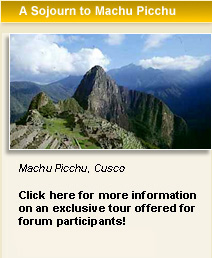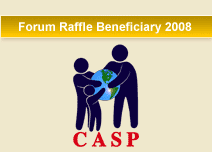Speaker > Biography
 Francisco Sagasti, Ph.D.'72
Francisco Sagasti, Ph.D.'72
Senior Associate
FORO Nacional/Internacional
Lima
Francisco Sagasti is Senior Associate at FORO Nacional/Internacional, an institution created to promote democratic governance and to foster dialogue and consensus on critical development issues, Chair of the Board of the Science and Technology Program (FINCyT) at the Office of the Prime Minister in Peru, member of the Board of Governors of the Canadian International Development Research Centre (IDRC), and member of the international advisory board of The Lemelson Foundation and of the Technical Cooperation Board of the International Atomic Energy Organization. He advises and consults with international organizations, private foundations, public sector agencies in a variety of subjects, including development financing, social policies, development strategies, science and technology policies, international relations and development cooperation. In addition to various academic, private sector and government advisory positions in Peru and other countries, he has been Director of the Agenda: PERÚ program at FORO Nacional/Internacional; Chief of Strategic Planning and senior advisor at the World Bank; visiting professor at the Wharton School of Finance, University of Pennsylvania; and chairman of the United Nations Advisory Committee on Science and Technology for Development. He holds a Ph.D. in operations research and social systems sciences from the University of Pennsylvania and engineering degrees from the National Engineering University in Lima, Peru and Pennsylvania State University.
Dr. Sagasti has been founder and executive director of GRADE a policy-oriented think tank in Peru; advisor to the ministers of Foreign Affairs, Education, Industry and the Prime Minister; advisor to the Chief of the National Planning Institute and the National Council for Science and Technology; vice-Chariman of the Board of the Industrial Technology Institute in Perú, and consultant to numerous private, public and civil society organizations. He has also taught at the Universidad del Pacífico and the Pontificia Universidad Católica del Perú, and has been visiting lecturer at several universities in the United States, Europe and developing regions. He has also held several advisory and executive positions with international and academic organizations, and traveled extensively throughout the developing world.
Dr. Sagasti is the author of more than 20 books and monographs, including: Power, Purse and Numbers: A Diagnostic Study of the UN Budget and Finance Process and Structure (with Ursula Casabonne and Fernando Prada), Stockholm, The Four Nations Initiative, October 2007; The Future of Development Financing: Challenges and Strategic Choices (with K. Bezanson and F. Prada), London, Palgrave McMillan, 2005; Knowledge and Innovation for Development: The Sisyphus Challenge of the 21st Century, Cheltenham, Edward Elgar, 2004; Financing and Providing Global Public Goods: Expectations and Prospects (with K. Bezanson), Stockholm, Ministry for Foreign Affairs, 2001; Democracy and Good Government (with Pepi Patrón, Max Hernández and Nicolás Lynch), third edition, Lima, Editorial APOYO/Agenda: PERÚ, 2001; Development Cooperation in a Fractured global Order (with G. Alcalde), Ottawa, IDRC, 1999; Preventing Deadly Conflict: Does the World Bank Have a Role? (with John Stremlau), New York, Carnegie Commission for the Prevention of Deadly Conflict, 1998. He coordinated the publication of Development Strategies for the 21st Century: the case of Peru, Lima, Peru Report, 2001; and edited (with Celine Sachs and Jean-Jacques Salomon) The Uncertain Quest: Science, Technology and Development, Tokyo, United Nations University Press, 1994. He is also the author of about 200 papers, contributes frequently to newspapers and magazines in Lima, Peru, and has directed a nine-part TV series Abriendo Caminos on social and economic change in Peru that was broadcast on national television. He has received several honors, including the Paul Hoffman Award and the UN Peace Medal given by the Society for International Development.












